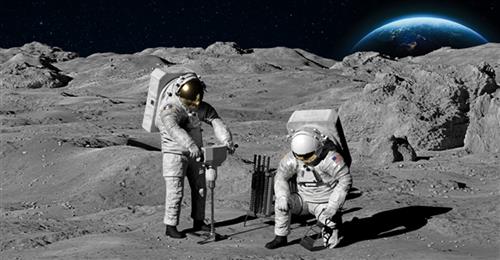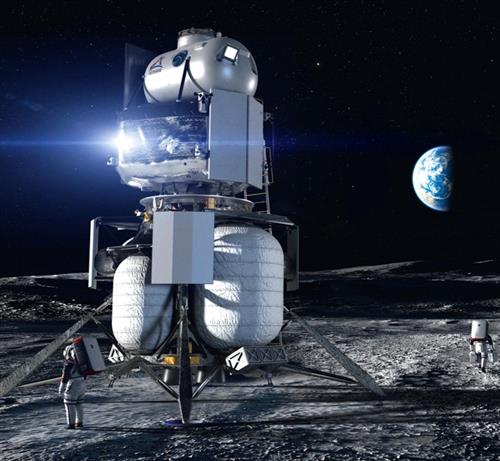NASA's Artemis Program - Returning to the Moon and Beyond
-



NASA's Artemis Program: NASA's Newest program to take astronauts back to the Moon (Learn how NASA will send the first woman and person of color to the Moon to extensively explore and establish a long-term presence on the Moon, and eventually learn how to take astronauts to Mars): https://www.nasa.gov/specials/artemis/
-
Cool Links About The Universe With Lots of Fascinating Photos
NEW - NASA's Website on Mars (Although Mars is the 4th planet from the Sun, it is the only planet we know of inhabited entirely by robots): https://science.nasa.gov/mars/
NEW - NASA's Explore Humans in Space Aboard the International Space Station (Spot the Space Station in the night sky): https://spotthestation.nasa.gov
NEW - NASA's Mars Perseverance Rover Mission Blog and Other Updates On Mars (These blog updates are provided by self-selected Mars 2020 mission team members who love to share what Perseverance is doing with the public): https://mars.nasa.gov/mars2020/mission/status/
NEW - NASA's Artemis Program Update (NASA has released an update on the Artemis Program. Learn what will happen in 2025 and 2026, and then in 2028. It's exciting!): https://www.nasa.gov/news-release/nasa-shares-progress-toward-early-artemis-moon-missions-with-crew/#:~:text=NASA%20will%20now%20target%20September,remains%20on%20track%20for%202028.
NASA's Artemis Program (NASA's Newest program to take astronauts back to the Moon. Learn how NASA will send the first woman and person of color to the Moon to extensively explore and establish a long-term presence on the Moon, and eventually learn how to take astronauts to Mars): https://www.nasa.gov/specials/artemis/
James Webb Space Telescope: NASA's Newest Outer Space Telescope (Learn how powerful NASA's newest telescope is allowing scientists to see the universe as far back as 4.5 billion years ago): https://webb.nasa.gov/
Orion: NASA's New Spacecraft (Learn how NASA scientists are developing a new spacecraft that will take humans to Mars): https://www.nasa.gov/specials/orionfirstflight/
Is There Life On Other Planets? (Learn about how scientists are studying and scanning the universe for possible life on distant solar systems): https://exoplanets.nasa.gov/faq/5/is-there-life-on-other-planets/
Mars Perseverance Rover (Learn about the amazing Mars rover that is studying the red planet): https://www.nasa.gov/perseverance
Planets (Learn about the eight planets orbiting the Sun): https://solarsystem.nasa.gov/planets/overview/
The Hubble Space Telescope (Learn how scientists study distant galaxies with the use of a powerful space telescope): https://www.nasa.gov/content/discoveries-hubbles-deep-fields
Beyond Our Solar System (Learn how scientists are studying galaxies far away in the universe): https://solarsystem.nasa.gov/solar-system/beyond/exploration/?page=0&per_page=10&order=launch_date+desc%2Ctitle+asc&search=&tags=Beyond+Our+Solar+System&category=3
The Moons (Learn about the various moons orbiting our Solar System's planets): https://solarsystem.nasa.gov/moons/overview/Meteors and Meteorites (Learn about the difference between meteors and meteorites): https://solarsystem.nasa.gov/asteroids-comets-and-meteors/meteors-and-meteorites/overview/?page=0&per_page=40&order=id+asc&search=&condition_1=meteor_shower%3Abody_type
The Apollo Missions (Learn about the U.S. manned missions to the Moon: 1967-1975): https://www.nasa.gov/mission_pages/apollo/missions/index.html
NASA Solar System Exploration (Learn about the U.S. exploration of the Solar System): https://solarsystem.nasa.gov/
NASA Mars Program (Learn about the ongoing U.S. exploration of Mars): https://mars.nasa.gov/The Soviet Missions (Learn about the unmanned Soviet missions to the Moon: 1959-1970): https://nssdc.gsfc.nasa.gov/planetary/lunar/lunarussr.html
The Soviet Lunar Program (Learn about the failed manned Soviet program to the Moon: 1964-1974): https://en.wikipedia.org/wiki/Soviet_crewed_lunar_programs#:~:text=Following%20the%20dual%20American%20successes,eventually%20brought%20to%20an%20end.
The Chinese Lunar Program (Learn about the unmanned Chinese Chang'e 5 Moon landing mission): https://www.space.com/topics/china-space-program
The International Space Station (Learn about the International Space Station, its purpose, and its 20 years orbiting the Earth): https://www.nasa.gov/mission_pages/station/main/index.html
The Lunar Rocks (Learn about the rocks and soil brought back from the Apollo Moon missions): https://curator.jsc.nasa.gov/lunar/#
KidsAstronomy: http://www.kidsastronomy.com/index.htm
Site contains basic information on the solar system and universe, with a fun model of the planets orbiting the sun. Contains links to other educational sites.
NASA for Students: http://www.nasa.gov/audience/forstudents/index.html
NASA's official site focused for students, you can make it more specific by clicking on the toolbar indicating for students grades 4-8. Has a wide range of information from planet comparison to other objects in space. Because it is our national space agency, it also has updates on space missions that are currently underway, and ones that will be upcoming.
Space.com: http://www.space.com/
This site contains a wide array of information, with a search box to help you narrow down the site to your topic. Also contains great images that could be used in a presentation.
Windows to the Universe: http://www.windows2universe.org/
Excellent site that contains well organized and accessible information on anything you may need for your projects. There is an in depth analysis of each planet, including their makeup, atmosphere, etc.
Scirus, Search Engine for Scientific Information Only: http://www.scirus.com/
This is a good search engine to find additional information on your subject, although much of the material supplied may be at a high school or college reading level.

